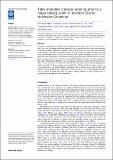Files in this item
Tides modulate crevasse opening prior to a major calving event at Bowdoin Glacier, Northwest Greenland
Item metadata
| dc.contributor.author | Van Dongen, Eef | |
| dc.contributor.author | Jouvet, Guillaume | |
| dc.contributor.author | Walter, Andrea | |
| dc.contributor.author | Todd, Joe | |
| dc.contributor.author | Zwinger, Thomas | |
| dc.contributor.author | Asaji, Izumi | |
| dc.contributor.author | Sugiyama, Shin | |
| dc.contributor.author | Walter, Fabian | |
| dc.contributor.author | Funk, Martin | |
| dc.date.accessioned | 2020-01-29T15:30:06Z | |
| dc.date.available | 2020-01-29T15:30:06Z | |
| dc.date.issued | 2020-02 | |
| dc.identifier | 266071678 | |
| dc.identifier | ebbab811-079a-4d80-9227-ef9c92dfe96a | |
| dc.identifier | 85076159225 | |
| dc.identifier | 000509742700010 | |
| dc.identifier.citation | Van Dongen , E , Jouvet , G , Walter , A , Todd , J , Zwinger , T , Asaji , I , Sugiyama , S , Walter , F & Funk , M 2020 , ' Tides modulate crevasse opening prior to a major calving event at Bowdoin Glacier, Northwest Greenland ' , Journal of Glaciology , vol. 66 , no. 255 , pp. 113-123 . https://doi.org/10.1017/jog.2019.89 | en |
| dc.identifier.issn | 0022-1430 | |
| dc.identifier.other | ORCID: /0000-0003-3183-043X/work/68281816 | |
| dc.identifier.uri | https://hdl.handle.net/10023/19382 | |
| dc.description | This research is part of the Sun2ice project (ETH Grant ETH-12 16-2), supported by the Dr. Alfred and Flora Spälti and the ETH Zurich Foundation. Field work was funded by the Swiss National Science Foundation, grant 200021-153179/1, and the Japanese Ministry of Education, Culture, Sports, Science and Technology through the Arctic Challenge for Sustainability (ArCS) project. Implementation of the remeshing routine has been performed under the Project HPC-EUROPA3 (INFRAIA-2016-1-730897), with the support of the EC Research Innovation Action under the H2020 Programme. | en |
| dc.description.abstract | Retreat of calving glaciers worldwide has contributed substantially to sea-level rise in recent decades. Mass loss by calving contributes significantly to the uncertainty of sea-level rise projections. At Bowdoin Glacier, Northwest Greenland, most calving occurs by a few large events resulting from kilometre-scale fractures forming parallel to the calving front. High-resolution terrestrial radar interferometry data of such an event reveal that crevasse opening is fastest at low tide and accelerates during the final 36 h before calving. Using the ice flow model Elmer/Ice, we identify the crevasse water level as a key driver of modelled opening rates. Sea water-level variations in the range of local tidal amplitude (1 m) can reproduce observed opening rate fluctuations, provided crevasse water level is at least 4 m above the low-tide sea level. The accelerated opening rates within the final 36 h before calving can be modelled by additional meltwater input into the crevasse, enhanced ice cliff undercutting by submarine melt, ice damage increase due to tidal cyclic fatigue, crevasse deepening or a combination of these processes. Our results highlight the influence of surface meltwater and tides on crevasse opening leading to major calving events at grounded tidewater glaciers such as Bowdoin. | |
| dc.format.extent | 2537280 | |
| dc.language.iso | eng | |
| dc.relation.ispartof | Journal of Glaciology | en |
| dc.subject | Crevasses | en |
| dc.subject | Glacier modelling | en |
| dc.subject | Glacier monitoring | en |
| dc.subject | Iceberg calving | en |
| dc.subject | G Geography (General) | en |
| dc.subject | Earth-Surface Processes | en |
| dc.subject | NDAS | en |
| dc.subject.lcc | G1 | en |
| dc.title | Tides modulate crevasse opening prior to a major calving event at Bowdoin Glacier, Northwest Greenland | en |
| dc.type | Journal article | en |
| dc.contributor.institution | University of St Andrews. School of Geography & Sustainable Development | en |
| dc.contributor.institution | University of St Andrews. Bell-Edwards Geographic Data Institute | en |
| dc.identifier.doi | https://doi.org/10.1017/jog.2019.89 | |
| dc.description.status | Peer reviewed | en |
This item appears in the following Collection(s)
Items in the St Andrews Research Repository are protected by copyright, with all rights reserved, unless otherwise indicated.

